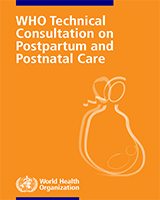All rights reserved. Publications of the World Health Organization can be obtained from WHO Press, World Health Organization, 20 Avenue Appia, 1211 Geneva 27, Switzerland (tel.: +41 22 791 3264; fax: +41 22 791 4857; e-mail: tni.ohw@redrokoob). Requests for permission to reproduce or translate WHO publications – whether for sale or for noncommercial distribution – should be addressed to WHO Press, at the above address (fax: +41 22 791 4806; e-mail: tni.ohw@snoissimrep).
NCBI Bookshelf. A service of the National Library of Medicine, National Institutes of Health.
WHO Technical Consultation on Postpartum and Postnatal Care. Geneva: World Health Organization; 2010.
- Assessment
A core health care professional making a judgement about the well-being of a woman or infant.
- Breastfeeding counsellor
A woman who has received specific training in counselling skills to provide support to breastfeeding women.
- Breastfeeding peer support
Support offered by women who have themselves breastfed, are usually from similar socio-economic backgrounds and locality to the women they are supporting and who have received minimal training to support breastfeeding women.
- Coordinating healthcare professional
A named health care professional who is responsible for organizing the care of a woman and her baby during any stage of the postnatal period.
- Dyad
Mother and baby as a couple or pair.
- Evaluation
Action based upon assessment of a woman or infant which may require referral or additional competencies to provide treatment.
- Exclusive/full breastfeeding
Breast milk feeding without supplementation in the form of other solid or liquids.
- First postnatal contact
First contact after the end of intrapartum care.
- Formula milk/artificial milk
Modified cow's milk or modified soy liquid used for infant feeding in lieu of breast milk.
- Healthcare professional
Clinically educated and certified individual who provides postnatal care for a woman and/or her baby; most commonly midwives, general practitioners, health visitors.
- Healthy baby
A healthy baby should have normal colour for his/her ethnicity, maintain a stable body temperature, pass urine and open his/her bowels at regular intervals. A healthy baby initiates feeds, sucks well on the breast (or bottle) and settles between feeds.
A healthy baby is not excessively irritable or tense and is not excessively sleepy or floppy. The vital signs of a healthy baby should fall within the following ranges:
- Respiratory rate normally 30–60 breaths per minute
- Pulse rate, normally between 100–160 in a newborn
- Body temperature in a normal room environment of around 37 degrees Centigrade (if measured)
- Induration
The hardening of a normally soft tissue or organ.
- Maternity support worker
An individual who has received appropriate training and work under midwife or health visitor supervision in hospital or community postnatal care teams, providing basic care and support for women and their babies.
- Parents
Presumed to be the biological parents and primary carers of an infant, although it is recognized that this term may include other carers, such as grandparents, foster or adoptive parents, etc.
- Partners
Individuals in a relationship, who may be of either sexual orientation.
- Peer counsellor
A woman who has herself breastfed, is from similar socio-economic background and locality to the women she is counselling and who has received specific training in counselling skills to provide support to breastfeeding women.
- Postnatal care
Care during the first 6–8 weeks after birth.
Additional glossary
- Follow-up
Planned visit to/by a skilled health professional for a specific problem outside a routine visit.
- Readmission
Hospitalization after a discharge from a facility for the same or related condition.
- Routine care
Scheduled contacts with women and their babies at periods for estimated maximum impact on maintaining health and providing a package of effective interventions to all women and babies.
- Situational care
Care that is required because of incidence or prevalence of public health problems such as malaria, HIV, STIs, FGM, adolescent pregnancy. Care can be clinical or social support.
- Skilled health attendant
An individual who has received education and training to provide skilled postnatal care for a woman and/or her baby. These include midwives, general practitioners, and health visitors but may also apply to other health care workers who have acquired appropriate skills in postnatal care.
- Uncomplicated vaginal delivery
Unassisted vaginal birth of baby and placenta, with no maternal complications.
- Visit
Routine care.
- Glossary - WHO Technical Consultation on Postpartum and Postnatal CareGlossary - WHO Technical Consultation on Postpartum and Postnatal Care
Your browsing activity is empty.
Activity recording is turned off.
See more...
